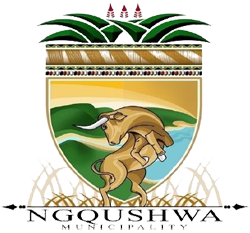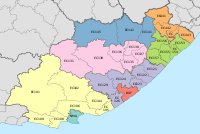Related Research Articles

Ngqushwa Local Municipality is an administrative area in the Amatole District of the Eastern Cape in South Africa.
The uMngeni Local Municipality council consists of twenty-five members elected by mixed-member proportional representation. Twelve councilors are elected by first-past-the-post voting in twelve wards, while the remaining are chosen from party lists so that the total number of party representatives is proportional to the number of votes received.
The uMdoni Local Municipality council consists of thirty-seven members elected by mixed-member proportional representation. Nineteen councillors are elected by first-past-the-post voting in nineteen wards, while the remaining eighteen are chosen from party lists so that the total number of party representatives is proportional to the number of votes received. In the election of 3 August 2016 the African National Congress (ANC) won a majority of twenty-three seats on the council.
The Nala Local Municipality council consists of twenty-four members elected by mixed-member proportional representation. Twelve councillors are elected by first-past-the-post voting in twelve wards, while the remaining twelve are chosen from party lists so that the total number of party representatives is proportional to the number of votes received.
The Phumelela Local Municipality council consists of sixteen members elected by mixed-member proportional representation. Eight councillors are elected by first-past-the-post voting in eight wards, while the remaining eight are chosen from party lists so that the total number of party representatives is proportional to the number of votes received.
The Dannhauser Local Municipality council consists of twenty-five members elected by mixed-member proportional representation. Thirteen councillors are elected by first-past-the-post voting in thirteen wards, while the remaining twelve are chosen from party lists so that the total number of party representatives is proportional to the number of votes received.
The Mthonjaneni Local Municipality council consists of twenty-five members elected by mixed-member proportional representation. Thirteen councillors are elected by first-past-the-post voting in thirteen wards, while the remaining twelve are chosen from party lists so that the total number of party representatives is proportional to the number of votes received.
The Msinga Local Municipality council consists of forty-one members elected by mixed-member proportional representation. Twenty-one councillors are elected by first-past-the-post voting in twenty-one wards, while the remaining twenty are chosen from party lists so that the total number of party representatives is proportional to the number of votes received. In the election of 1 November 2021 the Inkatha Freedom Party (IFP) won a majority of twenty-seven seats on the council.
The Jozini Local Municipality council consists of forty-five members elected by mixed-member proportional representation. Twenty-three councillors are elected by first-past-the-post voting in twenty-three wards, while the remaining twenty-two are chosen from party lists so that the total number of party representatives is proportional to the number of votes received.
The Maphumulo Local Municipality council consists of twenty-three members elected by mixed-member proportional representation. Twelve councillors are elected by first-past-the-post voting in twelve wards, while the remaining eleven are chosen from party lists so that the total number of party representatives is proportional to the number of votes received.
The Greater Kokstad Local Municipality council consists of nineteen members elected by mixed-member proportional representation. Ten councillors are elected by first-past-the-post voting in ten wards, while the remaining nine are chosen from party lists so that the total number of party representatives is proportional to the number of votes received.
The Ulundi Local Municipality council consists of forty-seven members elected by mixed-member proportional representation. Twenty-four councillors are elected by first-past-the-post voting in twenty-four wards, while the remaining twenty-three are chosen from party lists so that the total number of party representatives is proportional to the number of votes received. In the election of 1 November 2021 the Inkatha Freedom Party (IFP) won a majority of thirty-two seats on the council.
The Okhahlamba Local Municipality council consists of twenty-nine members elected by mixed-member proportional representation. Fifteen councillors are elected by first-past-the-post voting in fifteen wards, while the remaining fourteen are chosen from party lists so that the total number of party representatives is proportional to the number of votes received. In the election of 1 November 2021 no party won a majority on the council. The Inkatha Freedom Party (IFP) obtained a plurality of nine seats.
The Kou-Kamma Local Municipality council consists of twelve members elected by mixed-member proportional representation. Six councillors are elected by first-past-the-post voting in six wards, while the remaining six are chosen from party lists so that the total number of party representatives is proportional to the number of votes received.
The Mbhashe Local Municipality council consists of sixty-three members elected by mixed-member proportional representation. Thirty-two councillors are elected by first-past-the-post voting in thirty-two wards, while the remaining thirty-one are chosen from party lists so that the total number of party representatives is proportional to the number of votes received. In the election of 1 November 2021 the African National Congress (ANC) won a majority of forty-five seats.
The Umzimvubu Local Municipality council consists of fifty-five members elected by mixed-member proportional representation. Twenty-eight councillors are elected by first-past-the-post voting in twenty-eight wards, while the remaining twenty-seven are chosen from party lists so that the total number of party representatives is proportional to the number of votes received. In the election of 1 November 2021 the African National Congress (ANC) won a majority of forty-two seats.
The Mnquma Local Municipality council consists of sixty-three members elected by mixed-member proportional representation. Thirty-two councillors are elected by first-past-the-post voting in thirty-two wards, while the remaining thirty-one are chosen from party lists so that the total number of party representatives is proportional to the number of votes received. In the election of 1 November 2021 the African National Congress (ANC) won a majority of forty-five seats.
The Winnie Madikizela-Mandela Local Municipality council consists of sixty-four members elected by mixed-member proportional representation. Thirty-two councillors are elected by first-past-the-post voting in thirty-two wards, while the remaining thirty-two are chosen from party lists so that the total number of party representatives is proportional to the number of votes received. In the election of 1 November 2021 the African National Congress (ANC) won a majority of forty-eight seats.
The Mhlontlo Local Municipality council consists of fifty-one members elected by mixed-member proportional representation. Twenty-six councillors are elected by first-past-the-post voting in twenty-six wards, while the remaining twenty-five are chosen from party lists so that the total number of party representatives is proportional to the number of votes received. In the election of 1 November 2021 the African National Congress (ANC) won a majority of forty seats.
The Intsika Yethu Local Municipality council consists of forty-two members elected by mixed-member proportional representation. Twenty-one councillors are elected by first-past-the-post voting in twenty-one wards, while the remaining twenty-one are chosen from party lists so that the total number of party representatives is proportional to the number of votes received. In the election of 1 November 2021 the African National Congress (ANC) won a majority of thirty-five seats.
References
- ↑ "Election Result Table for LGE2000 — Ngqushwa". wikitable.frith.dev. Retrieved 2022-02-25.
- ↑ "Election Result Table for LGE2006 — Ngqushwa". wikitable.frith.dev. Retrieved 2022-02-25.
- ↑ "Election Result Table for LGE2011 — Ngqushwa". wikitable.frith.dev. Retrieved 2022-02-25.
- ↑ "Election Result Table for LGE2016 — Ngqushwa". wikitable.frith.dev. Retrieved 2022-02-25.
- ↑ "Election Result Table for LGE2021 — Ngqushwa". wikitable.frith.dev. Retrieved 2022-02-25.
